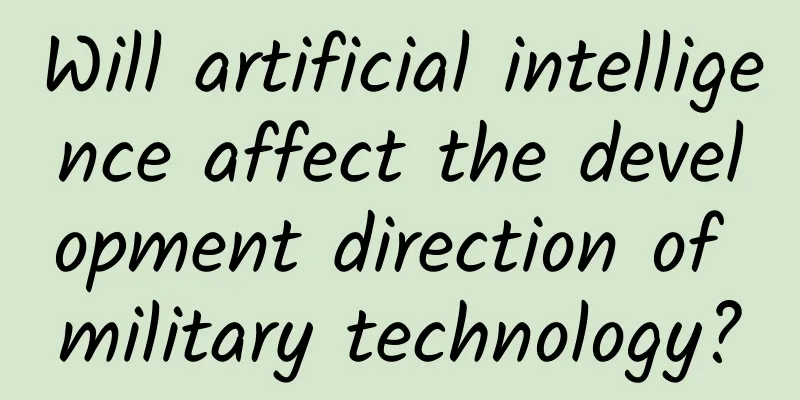Will artificial intelligence affect the development direction of military technology?

|
In the spring of 2023, a wave of artificial intelligence technology represented by CHAT-GPT swept the world. Artificial intelligence technology with the concept of "human in the loop" as its core has triggered extensive discussion and research. On the battlefield of the future, artificial intelligence will undoubtedly affect the development direction of military technology. A large amount of artificial intelligence is gradually being applied in the field of military technology, and it has also become an important direction for countries to deploy early and step up research and development. Government departments in many countries have issued artificial intelligence-related strategies or plans, demonstrating the high attention paid to artificial intelligence at the national level. Concept map of terrain analysis generated by individual artificial intelligence equipment (Image source: Sohu) The development of military technology can be divided into four major stages: the cold weapon era, the hot weapon era, the mechanization era and the information era. Artificial intelligence is the representative technology of the information era. The emergence of artificial intelligence has injected more possibilities into the information era of military technology. Not only is the demand very broad, but the victory of future wars will increasingly depend on the information advantage of the army. Artificial intelligence is a "catalyst" in the development of military science and technology. If used properly, it will greatly increase the speed and quality of development in the information age of military science and technology, but we must also be vigilant against the negative effects of artificial intelligence technology. Artificial intelligence cannot replace human intelligence. When solving war problems outside the programmable range, it requires human rational analysis ability, flexible adaptability, and moral discrimination ability. The artificial intelligence "MOSS" in the movie "The Wandering Earth" series has aroused widespread discussion in the society about the security of artificial intelligence. Its autonomous thinking mode also requires many scientific and technological fields, including the development of military science and technology, to put the discussion of artificial intelligence security on the agenda. The "Black Knight" unmanned combat vehicle developed by BAE Systems of the United States ** (Photo source: Sohu)** Military technology is inseparable from the actual battlefield environment, and the competition for "intelligence control" will be an important area in the battlefield environment. In a military confrontation environment, once an artificial intelligence system or weapon equipment is attacked by an opponent through malicious code, virus implantation, command tampering, etc., it will bring huge security risks. Therefore, the development of military technology must include artificial intelligence security in the development process, and deploy a variety of security defense science and technology in advance. Military technology researchers in many countries have foreseen the broad application prospects of artificial intelligence technology on the battlefield. They all regard artificial intelligence as a disruptive technology that "changes the rules of the battlefield game" and are stepping up the construction of a full-dimensional intelligent perception system for the battlefield, accelerating the development of battlefield intelligent command and control systems, unmanned combat systems, and intelligent weapons and equipment to seize the initiative in battlefield construction. Stills from the famous AI movie "I, Robot" First, countries have taken the initiative to build supporting technical platforms for AI technology to maximize the "energy" of AI technology. For example, by building a centralized and unified battlefield sensor network, integrating command and control systems, battlefield early warning systems, battlefield sensor systems, combat readiness and duty monitoring systems, weapons and equipment management and other resources, and building a centralized and unified battlefield sensor network system, AI can more conveniently retrieve information from various systems through interconnection, integration and intercommunication, thereby improving execution efficiency. Secondly, the Internet of Things should be built at the level of specific equipment, so that artificial intelligence can develop different equipment into its own "carrier", realize cross-equipment and cross-platform artificial intelligence, and make each combat unit and each type of equipment networked, integrated, autonomous, and intelligent. For example, artificial intelligence can call for drone reconnaissance and ground unmanned equipment for support in real time based on the battlefield situation perception system. This requires that in the process of military technology development, all battlefield equipment needs to be dynamically networked in the mode of the Internet of Things. Artificial intelligence has multiple aspects in the development of military technology. It will not only directly change the development speed and level of military technology, but also indirectly promote the value of "brain-computer integration" and "equipment interconnection". It is foreseeable that the future development of military technology is inseparable from artificial intelligence, and artificial intelligence will also play a greater role due to its application in the field of military technology. Expert profile: Wang Teng, a popular science expert on military equipment, holds a master's degree from the Army Armored Forces Academy. He has worked in frontline military news at CCTV and People's Daily, and has participated in the planning and production of many military science and technology topics. He has been conducting popular science research on domestic and foreign high-tech equipment and main combat equipment of various arms for a long time. He has published articles on platforms such as People's Daily Overseas Edition, Legal Daily, and Science Popularization China, and won the Advanced Individual Award issued by the "National Informatization Leading Group". Produced by: Popular Science of Chinese Military Technology Author: Wang Teng (senior military science writer) Scientific review: Wang Mingzhi (military expert) Planning: Jin He Producer: Guangming Online Science Department |
<<: Sea Anemone: Damn, some "dirty stuff" has sneaked in...
>>: When connected to Wi-Fi, will the data flow still be "stolen"?
Recommend
If you use your phone improperly, be careful that it will turn into a "grenade"! During the long holiday, let's talk about the issues of mobile phone charging
Qingming Festival Whether at home or traveling I ...
APP promotion: mainstream customer acquisition channels and methods
With the development of App development technolog...
Is eating Cordyceps sinensis useful for cancer?
I believe everyone knows the power of Cordyceps a...
Case Analysis: How to impact the Weibo topic list with 0 budget and link up 30 apps?
If you are working on new media in an APP, then c...
Community operation: Which is more important, growth or operation mechanism?
A few days ago, I was chatting with a friend abou...
Young seals put eels in their nostrils, just to keep up with the trend? | Nature Trumpet
In recent years, researchers have discovered a st...
BMW builds factory in Indonesia to boost luxury car sales
BMW launched the 7 Series sedan in Indonesia on N...
Understanding iOS memory management
Stories from ancient times Those who have experie...
【Lin Zouxin】Zouxin Academy Portrait Photography Post-production
【Lin Zouxin】Zouxin Academy Portrait Photography P...
How to increase the click-through rate of Tik Tok short videos?
Today I will share with you (what types of Tik To...
Classic APP case: How did Taobao Tmall App create the Double 11 traffic-generating banner with hundreds of millions of traffic?
Every year when the annual big promotion season c...
Measuring wind, clouds and rain, how capable is weather radar?
Author: Haiyueming Studio Weather radar and weath...
Five common misunderstandings about APP promotion and download, have you fallen into them?
Misconception 1: Thinking that code release will ...
When “water from the sky” meets “surface water”: Does heavy rain affect the normal drinking of tap water?
Science Times reporter Hu Lijuan Recently, contin...
3 steps to effectively improve the user retention rate of your product!
After entering the stock market, user value becom...









